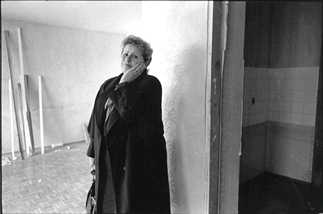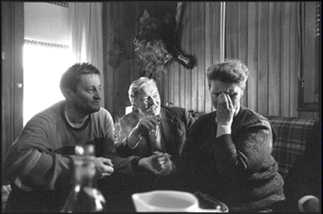|
|
 |
|
Walking through the streets in Ilidza after the transition, I noticed a couple of very dapper men fixing a garage door, dressed alike in loden coats with blue sailor caps. As we approached them a woman came from behind us and started to talk to them, and to us, in an agitated state. It became clear that she wanted us to come with her. It also emerged that she was married to one of the two men, and he seemed glad to see her go with us. Over the next few hours an amazing pilgrimage started to unfold. The woman, Suada, took us to all the houses and apartments linked to her family in the now-liberated suburbs. First to her apartment in Ilidza, then to her mother's house in Idjarici. Fragments of life history emerged: it was a fairly well-to-do, middle-class family that had worked hard, accumulated many possessions, had to flee at the beginning of the war from the Serb-held suburbs to Sarajevo, and were now returning. After their four-year absence, they found, as feared, that all had been looted -- the electric wire torn from the wall, the tiles in the kitchen and bathrooms gone, and all furniture, floors, and kitchen and bathroom appliances stripped to the bone. Suada was obviously upset about all this, and coming upon the various scenes she would start in a trance to wail, hands raised to the sky, ritualistically pacing around the devastation, starting to resemble the central heroine of some mournful Central European movie, camera- and light-conscious, performing the role of her life. But in the trips between the houses she seemed to calm down, smoking cigarettes and making small talk.
|
 |
|
At the end of the day Suada brought us back to Ilidza to the house of some friends, a Serbian family that had decided to stay. As we entered the warmth of the house, there was the ritual of taking off shoes, and the awkwardness of properly fitting everybody and us, the new arrivals, into the overstuffed living room furnished in a Baroque style, like a 19th-century hunting lodge complete with stuffed animals, beavers, ducks, and the obligatory deer antlers. Through the chaos of the embraces, we realized we were in the middle of a group of very old friends. They were from the three different nationalities taking turns to console Suada, who was at this point hyperventilating. The very best slivovitz came out, memories were exchanged, scars shown, pictures pulled out, including family photos of Suada and her husband when they were young and handsome. As Suada kept alternating between crying and laughter, her husband elegantly puffed on his ivory cigarette holder. As dusk approached, we seemed to drift back to a distant past as pictures of Franz Josef, of the Austro-Hungarian Empire, of the old Sarajevo, began to cover images from a more recent history. |
![]()